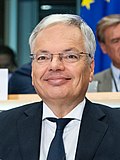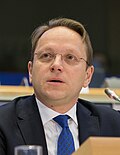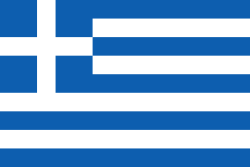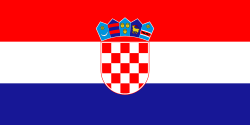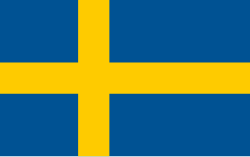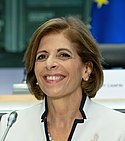Kommission von der Leyen I
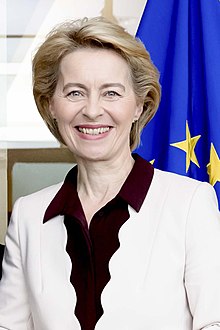
Die Kommission von der Leyen I bildete die Europäische Kommission von 2019 bis 2024. Sie nahm am 1. Dezember 2019 als Nachfolgerin der Kommission Juncker ihre Arbeit auf. Nach dem Austritt des Vereinigten Königreichs aus der Europäischen Union gehörten der Europäischen Kommission neben der Präsidentin 26 statt wie zuvor 27 Kommissare an. Sie wurde von der deutschen EVP (CDU)-Politikerin Ursula von der Leyen geleitet. Sie wurde anschließend an die Europawahl 2019 als erste Frau zur Kommissionspräsidentin gewählt. Am 1. Dezember 2024 wurde sie von der Kommission von der Leyen II abgelöst.
Wahl der Kommission

Nachdem sich der Europäische Rat der Staats- und Regierungschefs trotz wochenlanger Verhandlungen nicht auf einen der zur Europawahl 2019 angetretenen Spitzenkandidaten als Kommissionspräsident hatte einigen können,[1] wurde Ursula von der Leyen am 2. Juli 2019 durch das Gremium einmütig für das Amt nominiert. Nur die deutsche Bundeskanzlerin Angela Merkel enthielt sich wegen der Ablehnung durch den Koalitionspartner SPD, der auf dem Spitzenkandidatenprinzip bestand.[2]
Für die Wahl am 16. Juli 2019 benötigte ein Kandidat erstmals in der Geschichte eine breitere Mehrheit als die bisher bei den meisten Entscheidungen übliche von Volkspartei und Sozialdemokraten, da diese keine Mehrheit mehr im Europäischen Parlament hatten und mindestens die Liberalen oder die Grünen, vorzugsweise aber beide Kräfte für eine Mehrheit benötigt wurden. Eine Mehrheit gestützt auf die populistischen oder national gesinnten Kräfte rechts der Europäischen Volkspartei wurde vor wie nach der Europawahl sehr kritisch gesehen und von den Spitzenkandidaten stets ausgeschlossen. Nach der Nominierung von der Leyens galt das Europäische Parlament bis auf ihre eigene Parteienfamilie als mit der überwiegenden Mehrheit gegen ihre Kandidatur eingestellt und empört über das Vorgehen des Rates, was sie selbst eingestand und es sich deswegen zur Aufgabe machte, in den nächsten Wochen überhaupt erst eine Mehrheit für sich zu gewinnen. Dies bestand vor allem in der Vorstellung ihrer Ziele und ihrer Person vor den Fraktionen. Bei der Abstimmung erhielt von der Leyen daraufhin eine äußerst knappe absolute Mehrheit von 383 Stimmen im Europäischen Parlament, neun Stimmen mehr als die notwendige Mehrheit von 374 der 747 Europa-Abgeordneten.[3] Im Vorfeld waren deutlich mehr Stimmen für sie erwartet worden. Teilweise wurde spekuliert, ob sie das Ergebnis von Jean-Claude Juncker 2014 übertreffen würde, da der von substanziellen Teilen der Sozialdemokraten geäußerte Wille zur Ablehnung in solchen Überlegungen nicht wirklich ernst genommen wurde.
Nach von der Leyens Vorstellung in den einzelnen Fraktionen des Parlaments hatten neben der EVP auch die Liberalen entgegen ihrer ursprünglichen Ablehnung sich geschlossen für ihre Wahl ausgesprochen. Bei den Sozialdemokraten hingegen, die in ihr inhaltlich und fachlich kein Problem sahen, rief die Fraktionsspitze zwar ebenfalls zu von der Leyens Wahl auf, konnte sich aber nur auf eine geringe Mehrheit in der Fraktion stützen, da viele der Mitglieder (anders als die offiziell von vornherein ohne Spitzenkandidat angetretenen Liberalen) das Spitzenkandidatenprinzip in ganz besonderem Maße aufrechterhalten wollten. Nach der Sitzung wurde unmittelbar klar, dass ein gewichtiger Teil der Sozialdemokraten aus diesem prinzipiellen Grund vorhatte, gegen von der Leyen zu stimmen. Die Grünen setzten sich mit von der Leyens Absichten auseinander und erklärten, mit ihr zusammenarbeiten zu wollen, lehnten sie aber aus inhaltlichen Gründen geschlossen ab, da sie der Verwirklichung der formulierten Ziele durch die EVP nicht trauen wollten und das von von der Leyen vorgestellte Programm als zu vage ansahen. Damit wurden vor allem die Sozialdemokraten zur Schlüsselkraft für die Bestätigung der Nominierung, die vom Ausmaß der Zustimmung ihrer Fraktion abhängig war. Außerdem entschieden sich aufgrund der für von der Leyens Nominierung maßgeblichen Zustimmung der polnischen Regierung auch die Abgeordneten deren nationalkonservativer Regierungspartei PiS, die nach dem Brexit die Fraktion der Konservativen rechts der EVP dominiert, kurzfristig und widerwillig für die Wahl von der Leyens, wie einer ihrer Abgeordneten im Interview mit Phoenix beschrieb. Deswegen bestand nach dem Wahlgang auch die These, dass sie ohne die nicht gewünschte und vor der Europawahl regelmäßig ausgeschlossene Unterstützung von rechten Konservativen nicht gewählt worden wäre, was die erste Ablehnung eines designierten Kommissionspräsidenten und eine deutliche Stärkung der Position des Parlaments bedeutet hätte. Dass durch die verschiedenen Konstellationen und das Zusammenwirken aus inhaltlichen und prinzipiellen Gründen nach der Enthaltung zur Nominierung durch die Bundesregierung auch die deutschen Abgeordneten, anders als es die Abgeordneten anderer Länder bei einem Kandidaten aus ihrem Land pragmatischerweise machen würden, mit überwiegender Mehrheit gegen die Wahl einer deutschen Kandidatin in das wichtigste Amt der EU stimmten, wurde kritisiert und im Ausland mit Verwunderung betrachtet. Nur Union und FDP stimmten für von der Leyen, die SPD stimmte aus grundsätzlicher Sorge um das gerade erst gewonnene Ansehen der Europawahl gegen sie, die Grünen hatten darüber hinaus auch inhaltliche Vorbehalte. Dass die Linke eine konservative Kandidatin ablehnt und die AfD als Protestbewegung eine Kandidatin aus der Bundesregierung, war selbstverständlich. Somit kann auch die nicht selbstverständliche schwache deutsche Unterstützung als einer der Schlüsselfaktoren gesehen werden, an dem die Wahl beinahe gescheitert wäre.[4] Am 16. Juli 2019 wurde von der Leyen vom Europaparlament als erste Frau zur designierten Kommissionspräsidentin gewählt.[5] Am 27. November bestätigte das Europäische Parlament die von ihr vorgeschlagene Kommission als Ganze mit knapp 65 % der abgegebenen Stimmen.[6]
Politische Leitlinien
Ursula von der Leyen hat das Modell der Themen-„Cluster“, das bereits bei der Kommission Juncker neu eingeführt wurde, insoweit überarbeitet, als die Vizepräsidenten künftig die Rolle von Ministern einnehmen werden, während die restlichen Kommissare eher denen von (ihnen untergeordneten) Staatssekretären entsprechen.[7]
Das Regierungsprogramm ihrer Kommission folgt sechs Prioritäten, die gleichzeitig die Cluster darstellen:[8][9]
- Ein europäischer Green Deal: Erster klimaneutraler Kontinent werden
- Eine Wirtschaft im Dienste der Menschen: Soziale Gerechtigkeit und Wohlstand
- Ein Europa für das digitale Zeitalter: Aktive Teilhabe mit einer neuen Technologiegeneration
- Förderung unserer europäischen Lebensweise: Schutz unserer Bürger und unserer Werte
- Ein stärkeres Europa in der Welt: Festigung der verantwortungsvollen globalen Führungsrolle Europas
- Neuer Schwung für die Demokratie in Europa: Förderung, Schutz und Stärkung unserer Demokratie
Mitglieder der Kommission

Ursula von der Leyen strebte eine Kommission an, die das erste Mal seit Bestehen der Kommission paritätisch mit Frauen und Männern besetzt ist. Mit 12 Frauen unter den bisher 27 Nominierungen (inklusive von der Leyen) wurde dieses Ziel jedoch nicht voll erreicht. Das Vereinigte Königreich verzichtete aufgrund des Brexit auf eine Nominierung.[10] Die Kommission leitete daraufhin ein Vertragsverletzungsverfahren ein, damit das neu gewählte Kollegium dennoch seine Arbeit aufnehmen kann.
Vom EU-Parlament abgelehnt wurden die Nominierten Rovana Plumb (Rumänien, PSD/SPE; Verkehr), László Trócsányi (Ungarn; Fidesz/EVP; Erweiterung und Europäische Nachbarschaftspolitik) und Sylvie Goulard (Frankreich; MoDem/EDP; Binnenmarkt), sodass von ihren Mitgliedstaaten neue Kandidaten vorgeschlagen werden mussten.[11]
Das Europäische Parlament bestätigte schließlich am 27. November 2019 das überarbeitete Kollegium als Ganzes (siehe unten) mit den Stimmen der Christdemokraten (EVP), der Liberalen (RE) und der Sozialdemokraten (S&D). Die Sozialisten (GUE/NGL) und Rechtspopulisten (ID) stimmten gegen die neue Kommission, während die Grünen (G/EFA) sich enthielten. Die Stimmen der Konservativen (EKR) waren gespalten.[12] Konkret stimmten 461 Abgeordnete dafür, 157 dagegen und 89 enthielten sich.[13] Die Kommission konnte damit am 1. Dezember 2019 ihre Arbeit aufnehmen.[5]
Am 26. August 2020 trat Handelskommissar Phil Hogan von seinem Amt zurück. Die irische Regierung nominierte Mairead McGuinness als Kommissarin. Von der Leyen übertrug McGuiness das zuvor von Valdis Dombrovski gehaltene Portfolio und ernannte diesen zum neuen Kommissar für Handel.[14] Am 15. Mai 2023 trat Innovations- und Jugendkommissarin Marija Gabriel von ihrem Amt zurück. Die bulgarische Regierung nominierte Iliana Iwanowa als Nachfolgerin; sie übernahm am 19. September 2023 die Ressorts ihrer Vorgängerin.[15]
Nach der Europawahl 2024 traten Adina Vălean, Kommissarin für Verkehr, und Virginijus Sinkevičius, Kommissar für Umwelt und Ozeane, am 15. bzw. 16. Juli 2024 von ihren Ämtern zurück, um ihre Mandate im Europäischen Parlament wahrzunehmen. Vorübergehend wurden ihre Ressorts von Wopke Hoekstra und Maroš Šefčovič übernommen.[16]
Ressortprinzip
Ursula von der Leyen entschied sich für die Ernennung von drei sogenannten geschäftsführenden Vizepräsidenten („Executive Vice Presidents“), die eine herausragende Stellung besaßen, sowie fünf weiteren Vizepräsidenten. Fünf der acht Vizepräsidenten leiteten einen Themenkomplex aus den oben genannten politischen Prioritäten der Kommission, denen alle anderen Kommissare zugeordnet waren. Der Themenbereich „Neuer Schwung für die Europäische Demokratie“ hingegen hatte keine formale Leitung, wurde allerdings von den beiden Vizepräsidentinnen Jourová und Šuica betreut. Der Vizepräsident Šefčovič leitete keine Gruppe, sondern arbeitete ressortübergreifend.[17][18][19][20]
Präsidentin
| Amt | Bild | Name | Mitgliedstaat | nationale Partei | Europapartei | Fraktion im EU-Parlament | Zugeordnete Generaldirektionen | ||
|---|---|---|---|---|---|---|---|---|---|
| Präsidentin | 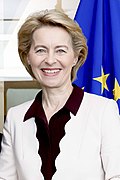 | Ursula von der Leyen | CDU | EVP | EVP | SG, SJ, COMM, IDEA | |||
Geschäftsführende Vizepräsidenten (Kommissare)
| Ressort | Bild | Name | Mitgliedstaat | nationale Partei | Europapartei | Fraktion im EU-Parlament | Zugeordnete Generaldirektionen | ||
|---|---|---|---|---|---|---|---|---|---|
| „Ein Europa für das digitale Zeitalter“ (inkl. Wettbewerb[21][22] und ab September 2024 auch kommissarisch Binnenmarkt) |  | Margrethe Vestager | RV | ALDE | RE | COMP | |||
| „Eine Wirtschaft im Dienste der Menschen“ (ab August 2020 inkl. Handel) |  | Valdis Dombrovskis | Vienotība | EVP | EVP | TRADE | |||
Vizepräsidenten (Kommissare)
| Ressort | Bild | Name | Mitgliedstaat | nationale Partei | Europapartei | Fraktion im EU-Parlament | Generaldirektionen | ||
|---|---|---|---|---|---|---|---|---|---|
| „Ein stärkeres Europa in der Welt“ |  | Josep Borrell | PSC | SPE | S&D | EEAS, FPI | |||
| Werte und Transparenz („Neuer Schwung für die Europäische Demokratie“) |  | Věra Jourová | ANO 2011 | ALDE | RE | ||||
| „Förderung der Europäischen Lebensweise“ |  | Margaritis Schinas | ND | EVP | EVP | ||||
| Interinstitutionelle Beziehungen und Vorausschau (sowie zusätzlich ab Oktober 2023 European Green Deal) | 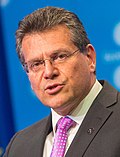 | Maroš Šefčovič | parteilos | JRC | |||||
| Demokratie und Demografie („Neuer Schwung für die Europäische Demokratie“) |  | Dubravka Šuica | HDZ | EVP | EVP | COMM | |||
Weitere Kommissare
Ehemalige Kommissare
| Ressort (Amtszeit) | Bild | Name | Mitgliedstaat | nationale Partei | Europapartei | Fraktion im Europäischen Parlament | Zugeordnete Generaldirektionen | ||
|---|---|---|---|---|---|---|---|---|---|
| Binnenmarkt (inkl. Verteidigung und Raumfahrt) bis September 2024[24] |  | Thierry Breton | parteilos | CNECT, GROW, neue DG für Verteidigung | |||||
| Innovation und Jugend bis Mai 2023[25] | Marija Gabriel | GERB | EVP | EVP | RTD, EAC, JRC | ||||
| Handel bis August 2020 | 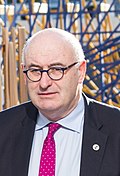 | Phil Hogan[26] | FG | EVP | EVP | TRADE | |||
| Klimaschutz und European Green Deal bis August 2023[27] | Frans Timmermans | PvdA | SPE | S&D | CLIMA | ||||
| Die Farben zeigen die Zugehörigkeit zu den europäischen Parteien an: |
Weblinks
- Website der Europäischen Kommission
- „Eine Union, die mehr erreichen will: Meine Agenda für Europa“: Regierungsprogramm der Kommission von der Leyen (PDF)
- Prioritäten der Europäischen Kommission 2019–2024
- EU Whoiswho. (PDF; 3,9 MB) Amtliches Verzeichnis der Europäischen Union
Einzelnachweise
- ↑ Juncker-Nachfolge: Von der Leyen soll EU-Kommissionschefin werden, abgerufen am 2. Juni 2019
- ↑ EU-Kommissionschefin: SPD lehnt Nominierung von der Leyens ab, auf spiegel.de, abgerufen am 2. Juli 2019.
- ↑ Die Zeit: EU-Nominierung: Ursula von der Leyen wirbt im Europaparlament um Unterstützung, 3. Juli 2019
- ↑ GroKo streitet über SPD-Nein zu von der Leyen, spiegel.de, 17. Juli 2019.
- ↑ a b Katharina Heflik, dpa, AFP: EU-Kommission: Von der Leyen benennt Kandidaten aus Ungarn und Frankreich. In: Die Zeit. 29. Oktober 2019, ISSN 0044-2070 (zeit.de [abgerufen am 5. November 2019]).
- ↑ Approval of the European Commission 2019-2024. Abgerufen am 28. November 2019 (englisch).
- ↑ politico.eu: Von der Leyen looks to overhaul Commission power structure
- ↑ Prioritäten der Kommission von der Leyen (offizielle Webseite). Abgerufen am 1. Dezember 2019.
- ↑ Ursula von der Leyen: A Union that strives for more. In: Regierungsprogramm. Europäische Kommission, abgerufen am 1. Dezember 2019 (englisch).
- ↑ EURACTIV: Großbritannien will offiziell keinen neuen EU-Kommissar benennen
- ↑ EU-Parlament stoppt Macrons Kandidatin für Kommission. In: ORF.at. 10. Oktober 2019, abgerufen am 10. Oktober 2019.
- ↑ Election of the Commission - VoteWatch Europe. Abgerufen am 2. Dezember 2019 (englisch).
- ↑ EU-Parlament bestätigt von der Leyen als Kommissionschefin. Spiegel Online, 27. November 2019, abgerufen am selben Tage.
- ↑ Tobias Kaiser: Ursula von der Leyen: Den ersten Skandal nutzt sie zu ihren Gunsten. In: Die Welt. 8. September 2020 (welt.de [abgerufen am 7. Oktober 2022]).
- ↑ Rat ernennt Iliana Ivanova zum neuen Mitglied der Europäischen Kommission. 19. September 2023, abgerufen am 3. Oktober 2023.
- ↑ Erklärung zum Rücktritt der Kommissionsmitglieder Vălean und Sinkevičius von ihren Ämtern bei der Kommission. Europäische Kommission, 15. Juli 2024, abgerufen am 24. Juli 2024.
- ↑ Der (europäische) Föderalist: Die EU-Kommission 2019
- ↑ politico.eu: von der Leyen wants Poland to have agriculture portfolio candidate says
- ↑ tagesschau.de: Von der Leyens Fleißaufgabe
- ↑ European Commission - PRESS RELEASES - Press release - The von der Leyen Commission: for a Union that strives for more. Abgerufen am 10. September 2019.
- ↑ EU-Kommission: Von der Leyen benennt drei mächtige Stellvertreter. 10. September 2019 (welt.de [abgerufen am 10. September 2019]).
- ↑ Tobias Kaiser: EU-Kommission: Von der Leyen setzt auf Klima und Digitales. 10. September 2019 (welt.de [abgerufen am 10. September 2019]).
- ↑ EU-Kommission: Neue irische Kommissarin McGuinness ernannt. In: deutschlandfunk.de. 12. Oktober 2020, archiviert vom (nicht mehr online verfügbar) am 13. Oktober 2020; abgerufen am 12. Oktober 2020. Info: Der Archivlink wurde automatisch eingesetzt und noch nicht geprüft. Bitte prüfe Original- und Archivlink gemäß Anleitung und entferne dann diesen Hinweis.
- ↑ https://www.spiegel.de/politik/eu-kommissar-thierry-breton-tritt-zurueck-a-61e6a153-107a-4bb3-a98b-e120db709726
- ↑ Krassen Nikolov: Rücktritt offiziell: EU-Kommissarin beginnt mit Regierungsbildung in Bulgarien. In: euractiv.de. 16. Mai 2023, abgerufen am 18. Mai 2023.
- ↑ Verstoß gegen Corona-Regeln. EU-Handelskommissar Hogan tritt zurück. In: FAZ.NET, 26. August 2020.
- ↑ Frans Timmermans tritt zurück, Maroš Šefčovič übernimmt sein Amt. In: ec.europa.eu. 23. August 2023, abgerufen am 23. August 2023.
Auf dieser Seite verwendete Medien
Das Bild dieser Flagge lässt sich leicht mit einem Rahmen versehen
Flagge Österreichs mit dem Rot in den österreichischen Staatsfarben, das offiziell beim österreichischen Bundesheer in der Charakteristik „Pantone 032 C“ angeordnet war (seit Mai 2018 angeordnet in der Charakteristik „Pantone 186 C“).
Flagge Portugals, entworfen von Columbano Bordalo Pinheiro (1857-1929), offiziell von der portugiesischen Regierung am 30. Juni 1911 als Staatsflagge angenommen (in Verwendung bereits seit ungefähr November 1910).
Man sagt, dass der grüne Teil die Mehrheit der katholischen Einwohner des Landes repräsentiert, der orange Teil die Minderheit der protestantischen, und die weiße Mitte den Frieden und die Harmonie zwischen beiden.
Die Europaflagge besteht aus einem Kranz aus zwölf goldenen, fünfzackigen, sich nicht berührenden Sternen auf azurblauem Hintergrund.
Sie wurde 1955 vom Europarat als dessen Flagge eingeführt und erst 1986 von der Europäischen Gemeinschaft übernommen.
Die Zahl der Sterne, zwölf, ist traditionell das Symbol der Vollkommenheit, Vollständigkeit und Einheit. Nur rein zufällig stimmte sie zwischen der Adoption der Flagge durch die EG 1986 bis zur Erweiterung 1995 mit der Zahl der Mitgliedstaaten der EG überein und blieb daher auch danach unverändert.Autor/Urheber: Annika Haas, EU2017EE Estonian Presidency, Lizenz: CC BY-SA 2.0
Nicolas Schmit, Minister of Labour, Employment and the Social and Solidarity Economy of Luxembourg,
at the Informal meeting of EU ministers for employment, social affairs, family and gender equality (iEPSCO) in Tallinn, on 19 July 2017.
© European Union, 2025, CC BY 4.0
Press conference by Virginijus Sinkevičius, European Commissioner, on the Commission's first zero pollution monitoring and outlook report for air, water and soil
Autor/Urheber: European Parliament from EU, Lizenz: CC BY 2.0
Before the European Parliament can vote the new European Commission led by Ursula von der Leyen into office, parliamentary committees will assess the suitability of commissioners-designate.
On 23-26 May, more than 200,000,000 people in 28 EU countries went to the polls to elect members of the European Parliament, giving them a strong democratic mandate, including voting into office the new European Commission and examining the competencies and abilities of its commissioners-designate. Elected members of the European Parliament will also listen to their ideas and will assess their willingness to take concrete actions on the issues that Europeans care about.
Each candidate commissioner is invited for a live-streamed, three-hour hearing in front of the committee or committees responsible for their proposed portfolio. The hearings will take place between Monday 30 September and Tuesday 8 October.
<a href="http://epinsta.eu/EPhearings2019" rel="noreferrer nofollow">epinsta.eu/EPhearings2019</a>
This photo is free to use under Creative Commons license CC-BY-4.0 and must be credited: "CC-BY-4.0: © European Union 2019 – Source: EP". (<a href="https://creativecommons.org/licenses/by/4.0/" rel="noreferrer nofollow">creativecommons.org/licenses/by/4.0/</a>) No model release form if applicable. For bigger HR files please contact: webcom-flickr(AT)europarl.europa.euAutor/Urheber: European Parliament, Lizenz: CC BY 2.5
Jutta Urpilainen, finnische EU-Kommissarin für Internationale Partnerschaften (2019)
Autor/Urheber: European Parliament from EU, Lizenz: CC BY 2.0
Before the European Parliament can vote the new European Commission led by Ursula von der Leyen into office, parliamentary committees will assess the suitability of commissioners-designate.
On 23-26 May, more than 200,000,000 people in 28 EU countries went to the polls to elect members of the European Parliament, giving them a strong democratic mandate, including voting into office the new European Commission and examining the competencies and abilities of its commissioners-designate. Elected members of the European Parliament will also listen to their ideas and will assess their willingness to take concrete actions on the issues that Europeans care about.
Each candidate commissioner is invited for a live-streamed, three-hour hearing in front of the committee or committees responsible for their proposed portfolio. The hearings will take place between Monday 30 September and Tuesday 8 October.
<a href="http://epinsta.eu/EPhearings2019" rel="noreferrer nofollow">epinsta.eu/EPhearings2019</a>
This photo is free to use under Creative Commons license CC-BY-4.0 and must be credited: "CC-BY-4.0: © European Union 2019 – Source: EP". (<a href="https://creativecommons.org/licenses/by/4.0/" rel="noreferrer nofollow">creativecommons.org/licenses/by/4.0/</a>) No model release form if applicable. For bigger HR files please contact: webcom-flickr(AT)europarl.europa.euAutor/Urheber: European Parliament, Lizenz: CC BY 2.5
Janusz Wojciechowski, polnischer EU-Kommissar für Landwirtschaft (2019)
Autor/Urheber: European Parliament from EU, Lizenz: CC BY 2.0
The Internal Market and the Industry committees questioned Thierry Breton, candidate for the Internal Market portfolio.
The presidents and political groups’ coordinators from both committees will meet at 17.00 to assess the performance of the Commissioner-designate.
Digital, environmental and social challenges
In his introductory speech, Mr Breton spoke of the digital, environmental and social challenges the EU is facing and how he plans to address them during his mandate. The digital transformation and climate change will be high on his agenda, in line with President-elect Ursula von der Leyen’s priorities.
Mr Breton said that 5G, blockchain, Artificial Intelligence, cybersecurity, cloud and quantum technologies would enable the EU to be a “key industrial player”. He defended “ambitious industrial policies”, which should also be socially responsible, in order “not to leave anyone behind”.
Read more: <a href="https://www.europarl.europa.eu/news/en/press-room/20191112IPR66319/hearing-of-commissioner-designate-thierry-breton" rel="noreferrer nofollow">www.europarl.europa.eu/news/en/press-room/20191112IPR6631...</a>
This photo is free to use under Creative Commons license CC-BY-4.0 and must be credited: "CC-BY-4.0: © European Union 2019 – Source: EP". (<a href="https://creativecommons.org/licenses/by/4.0/" rel="noreferrer nofollow">creativecommons.org/licenses/by/4.0/</a>) No model release form if applicable. For bigger HR files please contact: webcom-flickr(AT)europarl.europa.euAutor/Urheber: EU2017EE Estonian Presidency, Lizenz: CC BY 2.0
Photo: Arno Mikkor (EU2017EE)
Autor/Urheber: European Parliament from EU, Lizenz: CC BY 2.0
Hearings with Elisa Ferreira 🇵🇹 , candidate commissioner for cohesion and reforms 🇪🇺 Before the European Parliament can vote the new European Commission led by Ursula von der Leyen into office, parliamentary committees will assess the suitability of commissioners-designate.
On 23-26 May, more than 200,000,000 people in 28 EU countries went to the polls to elect members of the European Parliament, giving them a strong democratic mandate, including voting into office the new European Commission and examining the competencies and abilities of its commissioners-designate. Elected members of the European Parliament will also listen to their ideas and will assess their willingness to take concrete actions on the issues that Europeans care about.
Each candidate commissioner is invited for a live-streamed, three-hour hearing in front of the committee or committees responsible for their proposed portfolio. The hearings will take place between Monday 30 September and Tuesday 8 October.
epinsta.eu/EPhearings2019
Autor/Urheber: Estnische EU-Ratspräsidentschaft 2017, Lizenz: CC BY 2.0
Kadri Simson
(c) Walter Isack / Wikimedia Commons / CC-BY-SA-3.0
Mariya Gabriel, Bulgarien, 2014 Mitglied des Europäischen Parlaments (MEP)
Autor/Urheber: European Parliament, Lizenz: CC BY 2.5
Ylva Johansson, schwedische EU-Kommissarin für Inneres (2019)
Autor/Urheber: EU2018BG Bulgarian Presidency, Lizenz: CC BY 2.0
Věrа Jourová, Commissioner for Justice, Consumers and Gender Equality
Photo: Oleg Popov (EU2018BG)Autor/Urheber: EU2017EE Estonian Presidency, Lizenz: CC BY 2.0
Phil Hogan, Commissioner for Agriculture and Rural Development (DG AGRI), European Commission
Photo: Aron Urb (EU2017EE)Autor/Urheber: European Parliament, Lizenz: CC BY 2.5
Stella Kyriakides, zyprische EU-Kommissarin für Gesundheit (2019)
Autor/Urheber: Unión Europea en Perú from Lima, Perú, Lizenz: CC BY 2.0
Ursula von der Leyen
© European Union, 2025, CC BY 4.0
European Commissioners in 2021 (von der Leyen Commission)
Autor/Urheber: European Parliament from EU, Lizenz: CC BY 2.0
Before the European Parliament can vote the new European Commission led by Ursula von der Leyen into office, parliamentary committees will assess the suitability of commissioners-designate.
On 23-26 May, more than 200,000,000 people in 28 EU countries went to the polls to elect members of the European Parliament, giving them a strong democratic mandate, including voting into office the new European Commission and examining the competencies and abilities of its commissioners-designate. Elected members of the European Parliament will also listen to their ideas and will assess their willingness to take concrete actions on the issues that Europeans care about.
Each candidate commissioner is invited for a live-streamed, three-hour hearing in front of the committee or committees responsible for their proposed portfolio. The hearings will take place between Monday 30 September and Tuesday 8 October.
<a href="http://epinsta.eu/EPhearings2019" rel="noreferrer nofollow">epinsta.eu/EPhearings2019</a>
This photo is free to use under Creative Commons license CC-BY-4.0 and must be credited: "CC-BY-4.0: © European Union 2019 – Source: EP". (<a href="https://creativecommons.org/licenses/by/4.0/" rel="noreferrer nofollow">creativecommons.org/licenses/by/4.0/</a>) No model release form if applicable. For bigger HR files please contact: webcom-flickr(AT)europarl.europa.euAutor/Urheber: European Parliament from EU, Lizenz: CC BY 2.0
EU-Kommissions-Vizepräsidentin Margrethe Vestager
Autor/Urheber: European Parliament from EU, Lizenz: CC BY 2.0
Before the European Parliament can vote the new European Commission led by Ursula von der Leyen into office, parliamentary committees will assess the suitability of commissioners-designate.
On 23-26 May, more than 200,000,000 people in 28 EU countries went to the polls to elect members of the European Parliament, giving them a strong democratic mandate, including voting into office the new European Commission and examining the competencies and abilities of its commissioners-designate. Elected members of the European Parliament will also listen to their ideas and will assess their willingness to take concrete actions on the issues that Europeans care about.
Each candidate commissioner is invited for a live-streamed, three-hour hearing in front of the committee or committees responsible for their proposed portfolio. The hearings will take place between Monday 30 September and Tuesday 8 October.
<a href="http://epinsta.eu/EPhearings2019" rel="noreferrer nofollow">epinsta.eu/EPhearings2019</a>
This photo is free to use under Creative Commons license CC-BY-4.0 and must be credited: "CC-BY-4.0: © European Union 2019 – Source: EP". (<a href="https://creativecommons.org/licenses/by/4.0/" rel="noreferrer nofollow">creativecommons.org/licenses/by/4.0/</a>) No model release form if applicable. For bigger HR files please contact: webcom-flickr(AT)europarl.europa.euAutor/Urheber: European Parliament from EU, Lizenz: CC BY 2.0
Read more: <a href="http://www.europarl.europa.eu/news/en" rel="noreferrer nofollow">www.europarl.europa.eu/news/en</a>
This photo is free to use under Creative Commons license CC-BY-4.0 and must be credited: "CC-BY-4.0: © European Union 2020 – Source: EP". (<a href="https://creativecommons.org/licenses/by/4.0/" rel="noreferrer nofollow">creativecommons.org/licenses/by/4.0/</a>) No model release form if applicable. For bigger HR files please contact: webcom-flickr(AT)europarl.europa.euAutor/Urheber: European Parliament from EU, Lizenz: CC BY 2.0
Janez Lenarčič
Autor/Urheber: European People's Party, Lizenz: CC BY 2.0
EPP Summit, Maastricht, October 2016 (30154973070)
Autor/Urheber: European Parliament, Lizenz: CC BY 2.5
Olivér Várhelyi, ungarischer EU-Kommissar für Partnerschaft und Erweiterung (2019)
Autor/Urheber: European Parliament from EU, Lizenz: CC BY 2.0
Before the European Parliament can vote the new European Commission led by Ursula von der Leyen into office, parliamentary committees will assess the suitability of commissioners-designate.
On 23-26 May, more than 200,000,000 people in 28 EU countries went to the polls to elect members of the European Parliament, giving them a strong democratic mandate, including voting into office the new European Commission and examining the competencies and abilities of its commissioners-designate. Elected members of the European Parliament will also listen to their ideas and will assess their willingness to take concrete actions on the issues that Europeans care about.
Each candidate commissioner is invited for a live-streamed, three-hour hearing in front of the committee or committees responsible for their proposed portfolio. The hearings will take place between Monday 30 September and Tuesday 8 October.
<a href="http://epinsta.eu/EPhearings2019" rel="noreferrer nofollow">epinsta.eu/EPhearings2019</a>
This photo is free to use under Creative Commons license CC-BY-4.0 and must be credited: "CC-BY-4.0: © European Union 2019 – Source: EP". (<a href="https://creativecommons.org/licenses/by/4.0/" rel="noreferrer nofollow">creativecommons.org/licenses/by/4.0/</a>) No model release form if applicable. For bigger HR files please contact: webcom-flickr(AT)europarl.europa.euAutor/Urheber: European Parliament from EU, Lizenz: CC BY 2.0
After assessing all the commissioners-designate, MEPs will decide on 27 November whether to elect the Commission as a whole, allowing it to take office on 1 December. Ursula von der Leyen speaking in a packed plenary chamber Commission President-elect Ursula von der Leyen speaks to plenary
The plenary vote on Wednesday would bring to an end the long process of careful examination by Parliament of the proposed team of commissioners. Its objective was to ensure that the EU’s executive body has the democratic legitimacy to act in the interest of Europeans.
MEPs elected Ursula von der Leyen as Commission president in July. Then, from the end of September to mid-November, parliamentary committees organised hearings with each of the nominees to judge their suitability for their proposed post.
On 21 November political group leaders and Parliament’s president Sassoli agreed that the process of examination had been completed and that Parliament is ready to hold the final plenary vote.
On Wednesday 27 November, President-elect Ursula von der Leyen will present her team and the new Commission’s programme. Following a debate, MEPs will decide by simple majority whether to elect the Commission or not.
If approved, the new Commission will start work on 1 December.
Read our Top Story Collection here: <a href="https://www.europarl.europa.eu/news/en/headlines/priorities/commission-president-2019" rel="noreferrer nofollow">www.europarl.europa.eu/news/en/headlines/priorities/commi...</a>
Autor/Urheber: European Parliament from EU, Lizenz: CC BY 2.0
Before the European Parliament can vote the new European Commission led by Ursula von der Leyen into office, parliamentary committees will assess the suitability of commissioners-designate.
On 23-26 May, more than 200,000,000 people in 28 EU countries went to the polls to elect members of the European Parliament, giving them a strong democratic mandate, including voting into office the new European Commission and examining the competencies and abilities of its commissioners-designate. Elected members of the European Parliament will also listen to their ideas and will assess their willingness to take concrete actions on the issues that Europeans care about.
Each candidate commissioner is invited for a live-streamed, three-hour hearing in front of the committee or committees responsible for their proposed portfolio. The hearings will take place between Monday 30 September and Tuesday 8 October.
<a href="http://epinsta.eu/EPhearings2019" rel="noreferrer nofollow">epinsta.eu/EPhearings2019</a>
This photo is free to use under Creative Commons license CC-BY-4.0 and must be credited: "CC-BY-4.0: © European Union 2019 – Source: EP". (<a href="https://creativecommons.org/licenses/by/4.0/" rel="noreferrer nofollow">creativecommons.org/licenses/by/4.0/</a>) No model release form if applicable. For bigger HR files please contact: webcom-flickr(AT)europarl.europa.euAutor/Urheber: European Parliament from EU, Lizenz: CC BY 2.0
After assessing all the commissioners-designate, MEPs will decide on 27 November whether to elect the Commission as a whole, allowing it to take office on 1 December. Ursula von der Leyen speaking in a packed plenary chamber Commission President-elect Ursula von der Leyen speaks to plenary
The plenary vote on Wednesday would bring to an end the long process of careful examination by Parliament of the proposed team of commissioners. Its objective was to ensure that the EU’s executive body has the democratic legitimacy to act in the interest of Europeans.
MEPs elected Ursula von der Leyen as Commission president in July. Then, from the end of September to mid-November, parliamentary committees organised hearings with each of the nominees to judge their suitability for their proposed post.
On 21 November political group leaders and Parliament’s president Sassoli agreed that the process of examination had been completed and that Parliament is ready to hold the final plenary vote.
On Wednesday 27 November, President-elect Ursula von der Leyen will present her team and the new Commission’s programme. Following a debate, MEPs will decide by simple majority whether to elect the Commission or not.
If approved, the new Commission will start work on 1 December.
Read our Top Story Collection here: <a href="https://www.europarl.europa.eu/news/en/headlines/priorities/commission-president-2019" rel="noreferrer nofollow">www.europarl.europa.eu/news/en/headlines/priorities/commi...</a>
Autor/Urheber: Ministerie van Buitenlandse Zaken, Lizenz: CC BY-SA 2.0
Overdracht van ministerie van Buitenlandse Zaken van Ben Knapen aan Wopke Hoekstra. In aanwezigheid van Tom de Bruijn en Liesje Schreinemacher
Autor/Urheber: European People's Party, Lizenz: CC BY 2.0
A23A0071
Autor/Urheber: European Parliament from EU, Lizenz: CC BY 2.0
Before the European Parliament can vote the new European Commission led by Ursula von der Leyen into office, parliamentary committees will assess the suitability of commissioners-designate.
On 23-26 May, more than 200,000,000 people in 28 EU countries went to the polls to elect members of the European Parliament, giving them a strong democratic mandate, including voting into office the new European Commission and examining the competencies and abilities of its commissioners-designate. Elected members of the European Parliament will also listen to their ideas and will assess their willingness to take concrete actions on the issues that Europeans care about.
Each candidate commissioner is invited for a live-streamed, three-hour hearing in front of the committee or committees responsible for their proposed portfolio. The hearings will take place between Monday 30 September and Tuesday 8 October.
<a href="http://epinsta.eu/EPhearings2019" rel="noreferrer nofollow">epinsta.eu/EPhearings2019</a>
This photo is free to use under Creative Commons license CC-BY-4.0 and must be credited: "CC-BY-4.0: © European Union 2019 – Source: EP". (<a href="https://creativecommons.org/licenses/by/4.0/" rel="noreferrer nofollow">creativecommons.org/licenses/by/4.0/</a>) No model release form if applicable. For bigger HR files please contact: webcom-flickr(AT)europarl.europa.euAutor/Urheber: European Parliament from EU, Lizenz: CC BY 2.0
Before the European Parliament can vote the new European Commission led by Ursula von der Leyen into office, parliamentary committees will assess the suitability of commissioners-designate.
On 23-26 May, more than 200,000,000 people in 28 EU countries went to the polls to elect members of the European Parliament, giving them a strong democratic mandate, including voting into office the new European Commission and examining the competencies and abilities of its commissioners-designate. Elected members of the European Parliament will also listen to their ideas and will assess their willingness to take concrete actions on the issues that Europeans care about.
Each candidate commissioner is invited for a live-streamed, three-hour hearing in front of the committee or committees responsible for their proposed portfolio. The hearings will take place between Monday 30 September and Tuesday 8 October.
<a href="http://epinsta.eu/EPhearings2019" rel="noreferrer nofollow">epinsta.eu/EPhearings2019</a>
This photo is free to use under Creative Commons license CC-BY-4.0 and must be credited: "CC-BY-4.0: © European Union 2019 – Source: EP". (<a href="https://creativecommons.org/licenses/by/4.0/" rel="noreferrer nofollow">creativecommons.org/licenses/by/4.0/</a>) No model release form if applicable. For bigger HR files please contact: webcom-flickr(AT)europarl.europa.eu

